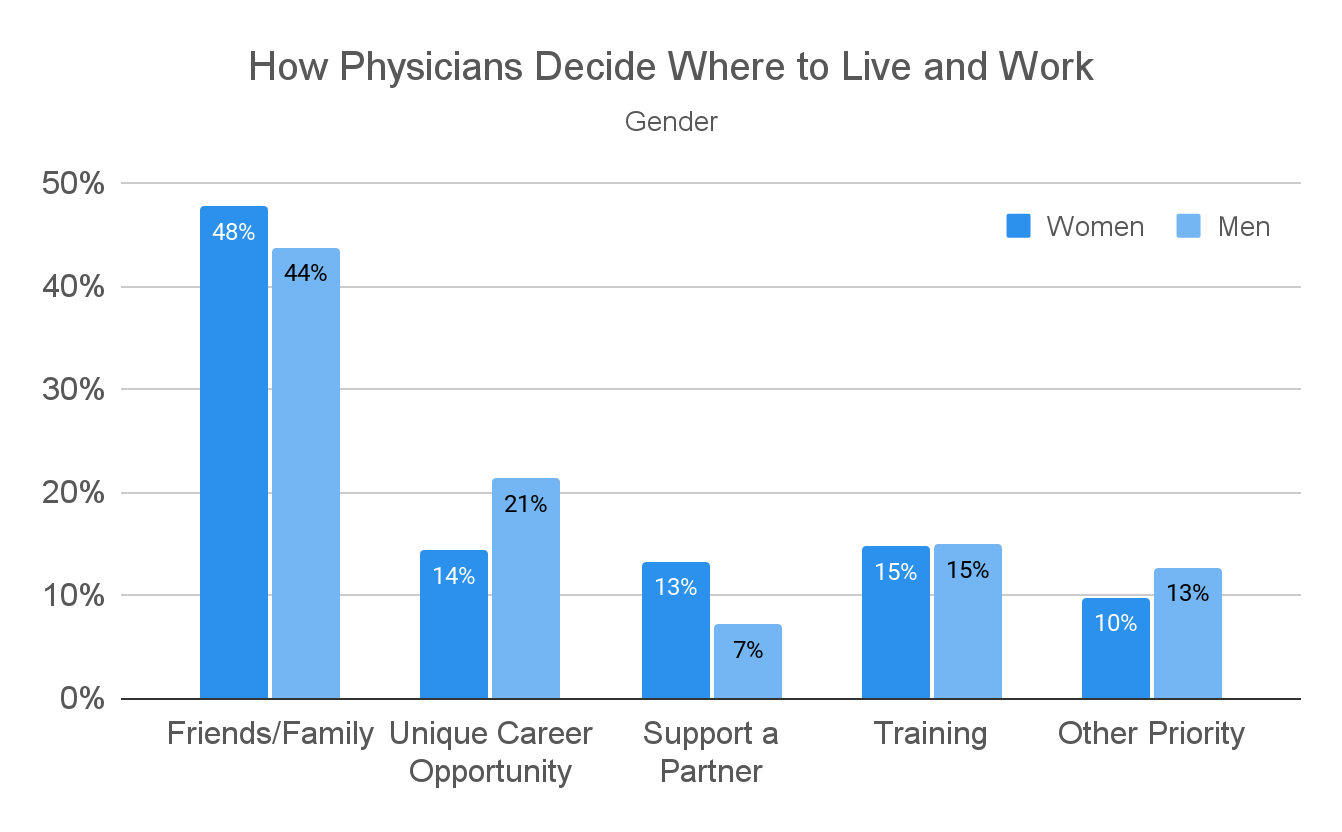Above all else, physicians want to live close to friends and family when finding a place to work, according to a recent Doximity poll.
For many physicians, the first real opportunity they have to choose where they work comes after residency, due in large part to the highly selective nature of medical training. And when the opportunity arrives, there are a wide range of factors to consider: financial motivations such as salary and cost of living; wanting “a big change”; moving out from under the shadow of one’s place of training; and even weather.
Yet amid the array of considerations, the general trend for physicians is to prioritize working near friends or family. Among more than 3,600 physicians who participated in the poll, 47% say the desire to be near friends or family drives their decision. The next most common reason is a unique career opportunity (18%), followed by staying near their place of medical training (15%), supporting a partner’s career (9%), and other priorities (11%).
“Clearly, as a causal factor, friends and family seem to be leading,” hematologist and medical oncologist Dr. Panju Prithviraj said. “Indeed, I know of those who chose a job for fame, to live in a place of interest, for financial benefits, etc., only to quit due to lack of friends and family.”
Career Decisions
Numerous studies in recent years have documented that women are more likely to move, and to move longer distances, to support their partner’s career. According to the poll, women are almost twice as likely as men to consider their partner's career when choosing their own work location. In contrast, men are 1.6 times more likely than women to pursue a personal career opportunity when choosing their work location.
A potential driver for these differences may be cultural gender roles for shared decision-making within relationships. There is also evidence that women physicians in general have lower salaries, rates of employment, and leadership positions, which may help explain why women are less likely than men to move for a personal career opportunity in medicine.
 Generational Divide
Generational Divide
Living near friends and family also appears to be a big draw for younger physicians. The majority of those in their 20s (62%) and 30s (54%) prioritize being close to friends or family when deciding where to work. In contrast, less than half of physicians in their 40s through 60s choose a job for that reason, dropping to as low as 27% of physicians 70 and older.
This pattern mirrors generational differences in the U.S. Earlier generations such as baby boomers have been more willing to move away from their family, including in order to secure their preferred job, compared with newer generations such as millennials who have been less geographically mobile overall. The trend could also stem from the increased access physicians gain to unique professional opportunities as they grow in experience over time.
What’s more, prior studies have shown that younger physicians more so than older physicians emphasize work-life balance and their partner’s employment opportunities. And proximity to friends and family often aligns with those preferences.
For Dr. Brian Sullivan, an orthopaedic surgeon at the tail end of his residency, his next work location has been top of mind in recent months. In deciding which hand surgery fellowship to pursue, having his parents nearby has been the most important factor.
“Medicine can demand a lot from individuals, and having a support system or community where you work is incredibly helpful and essential for your success,” Dr. Sullivan said. “Further, I think you perform your best at work when you have a happy balance professionally and with your personal interests. Being close to friends and family personally helps me maintain this balance.”
Surgery vs. Primary Care
The poll results point to differences across medical specialties as well. Roughly a quarter of surgeons (23%) choose their job location because of a unique work opportunity compared with 13% of primary care physicians. Specialists are in the middle of the range at 20%.
A nearly twofold difference suggests that there might be more unique career opportunities available for surgeons than primary care physicians. The difference could also point to a more pressing need for surgeons to seize career opportunities when they can due to the specialized nature of the field.
“Depending on surgeon specialty and subspecialty, it may be more difficult for surgeons to find a good job specific to their specialty compared with primary care physicians,” said Dr. Jan Kamiński, clinical assistant professor of surgery at University of Illinois at Chicago. “Many uber-specialized surgeons (like pediatric heart surgeons) can only get jobs at major university centers. On the other hand, primary care physicians are in short supply everywhere and can essentially function as a solo practitioner.”
These differences aside, all specialties except for thoracic surgery prioritized being close to friends or family over all other factors. (This supplemental figure shows a detailed breakdown of how physicians decide where to live and work, by medical specialty.)
Seeking Community
Choosing to work near an established community is a common thread for many people in the U.S. An AAMC report from 2021 found that physicians were much more likely to continue practicing where they trained if they completed both medical school and residency in the same state. Increasing opportunities to that end could help address widespread concerns of overwork in medicine.
Though not necessarily a magic bullet, research has demonstrated the benefits of a sense of belonging and community, along with the support of family, toward mitigating physician burnout. With the transition period approaching for many recently graduated residents, where they decide to live and advance their careers will shape the broader trend in coming years.






